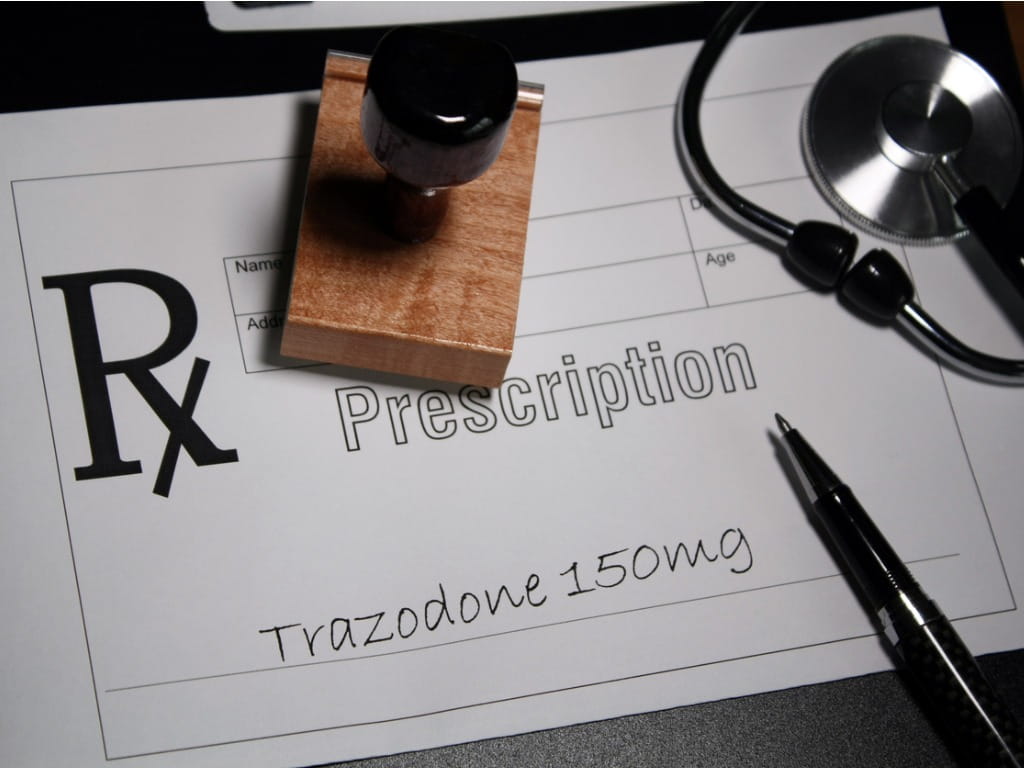Trazodone is often prescribed for sleep issues, leading some to wonder about its classification and safety. This article clarifies whether trazodone is a narcotic, explains how it works, discusses its uses, potential side effects, and important precautions.
Trazodone: Narcotic or Not?
Trazodone is not a narcotic. It’s classified as a serotonin antagonist and reuptake inhibitor (SARI), a type of antidepressant. Narcotics, also known as opioids, are powerful pain relievers with a high potential for misuse and dependence. Trazodone doesn’t fit this description and is not a controlled substance according to the FDA and DEA.
How Trazodone Works
Trazodone primarily affects serotonin levels in the brain. Serotonin is a neurotransmitter that plays a crucial role in mood regulation, sleep, and appetite. By increasing serotonin activity, trazodone can improve mood and promote sleep. This differs significantly from narcotics, which bind to opioid receptors in the brain to block pain signals.
Off-Label Use for Sleep
While primarily prescribed for major depressive disorder, trazodone is often used off-label to treat insomnia. Its sedative properties can help with sleep difficulties, but it’s important to remember that using it this way isn’t its primary function. The drowsiness associated with trazodone is a side effect of its impact on serotonin, not its intended therapeutic action.
Side Effects and Precautions
Like any medication, trazodone can cause side effects. Common side effects include dry mouth, blurry vision, drowsiness, and dizziness. A less common but serious side effect is priapism (a prolonged erection). Seek immediate medical attention if this occurs. Another potential risk is serotonin syndrome, especially when combined with other medications that increase serotonin levels. Avoid mixing trazodone with alcohol. Could you become dependent on Flexeril? Discover the potential for is flexeril addictive and learn important facts about this muscle relaxant.
Trazodone and Pregnancy
The effects of trazodone during pregnancy are not fully understood. Consult your doctor before taking trazodone if you’re pregnant, breastfeeding, or planning to become pregnant.
Discontinuing Trazodone
Avoid stopping trazodone abruptly. Withdrawal symptoms, like anxiety, agitation, and insomnia, might occur. Tapering off the medication under a doctor’s supervision is the recommended approach.
Overdose
Suspect a trazodone overdose? Contact Poison Control immediately.
Trazodone and Anxiety
Emerging research suggests trazodone may benefit individuals with anxiety. Discuss this possibility with your doctor. For exceptional spine care in Maple Grove, explore the advanced treatments and expertise available at iSpine Maple Grove, where your spinal health is their priority.
Trazodone vs. Narcotics: Key Differences
Trazodone is often mistaken for a narcotic due to its sedative effects. This section further clarifies the distinctions.
Understanding the Difference
Narcotics primarily relieve pain by acting on opioid receptors. Trazodone, on the other hand, primarily influences mood and sleep by affecting serotonin levels. It’s not designed for pain management.
Why the Confusion?
The drowsiness trazodone can cause often leads to the misconception that it’s a narcotic. However, drowsiness isn’t exclusive to narcotics and is a common side effect of many medications.
FDA Classification
The FDA doesn’t classify trazodone as a controlled substance due to its low potential for abuse and dependence. This is a key difference from narcotics, which are tightly regulated.
Off-Label Use for Insomnia
Trazodone’s sedative properties make it a common off-label treatment for insomnia. However, this doesn’t make it a narcotic.
Misuse and Dependence
While less likely than with narcotics, dependence on trazodone is possible. Withdrawal symptoms may occur upon discontinuation. Consult your doctor about potential risks.
Trazodone vs. Xanax: Understanding the Differences
Trazodone and Xanax are sometimes discussed together due to their use in treating anxiety and insomnia. However, they are not equivalent.
Different Mechanisms and Purposes
Trazodone primarily acts as an antidepressant, with off-label use for insomnia. Xanax is a benzodiazepine specifically designed for short-term anxiety relief. They work through different mechanisms and target different conditions.
Risks and Side Effects
Mixing trazodone and Xanax can amplify side effects like dizziness and confusion. Xanax carries a higher risk of addiction than trazodone.
Long-Term Anxiety Management
Xanax isn’t suitable for long-term anxiety management due to its addictive potential. Trazodone might be an option, but therapy and lifestyle changes are also crucial.
Insomnia Treatment
While both can treat insomnia, trazodone is generally preferred for long-term use due to Xanax’s addictive nature.
How They Work
Trazodone increases serotonin levels, while Xanax enhances GABA activity, a neurotransmitter that calms brain activity.
Comparison Table
| Feature | Trazodone | Xanax (Alprazolam) |
|---|---|---|
| Drug Class | Antidepressant (SARI) | Benzodiazepine |
| Primary Use | Depression, Insomnia | Anxiety, Panic Disorder |
| Addiction Risk | Low | High |
| Long-Term Use | Generally safe | Not recommended |
Misuse of Xanax
Misusing Xanax, especially by mixing it with other substances, can be life-threatening. The risks are significantly amplified when combined with other sedatives.
Consult Your Doctor
Always consult your doctor before starting any medication, including trazodone or Xanax.
Trazodone as a Sleeping Pill: Understanding Its Role
Trazodone is often used for sleep, but it’s not a typical sleeping pill. This section clarifies its role in sleep management.
Trazodone’s Role in Sleep
Trazodone is primarily an antidepressant. Its sleep-inducing effects are a secondary benefit, leading to its off-label use for insomnia.
How Trazodone Encourages Sleep
Trazodone boosts serotonin levels, which can promote feelings of calm and drowsiness. This differs from dedicated sleep aids that target different brain pathways.
Comparing Trazodone with Other Sleep Aids
Trazodone’s sleep-inducing effects are less potent and fast-acting than dedicated sleep medications. It’s a gentler option, potentially reducing the risk of next-day grogginess.
Side Effects
Common side effects include drowsiness, dizziness, dry mouth, and blurred vision. More serious side effects are possible, highlighting the need for a doctor’s guidance.
Who Should Avoid Trazodone?
Pregnant or breastfeeding women and individuals with certain health conditions should exercise caution or avoid trazodone.
Dependence
While not a narcotic, dependence on trazodone is possible with prolonged use. Avoid abrupt discontinuation.
Consult Your Doctor
Always consult your doctor before using trazodone for sleep. They can assess your situation and recommend the best course of action.
- Unlocking Francis Alexander Shields’ Finance Empire: A Comprehensive Biography - July 12, 2025
- Unveiling Francis Alexander Shields: A Business Legacy - July 12, 2025
- Francis Alexander Shields’ Business Career: A Comprehensive Overview - July 12, 2025















